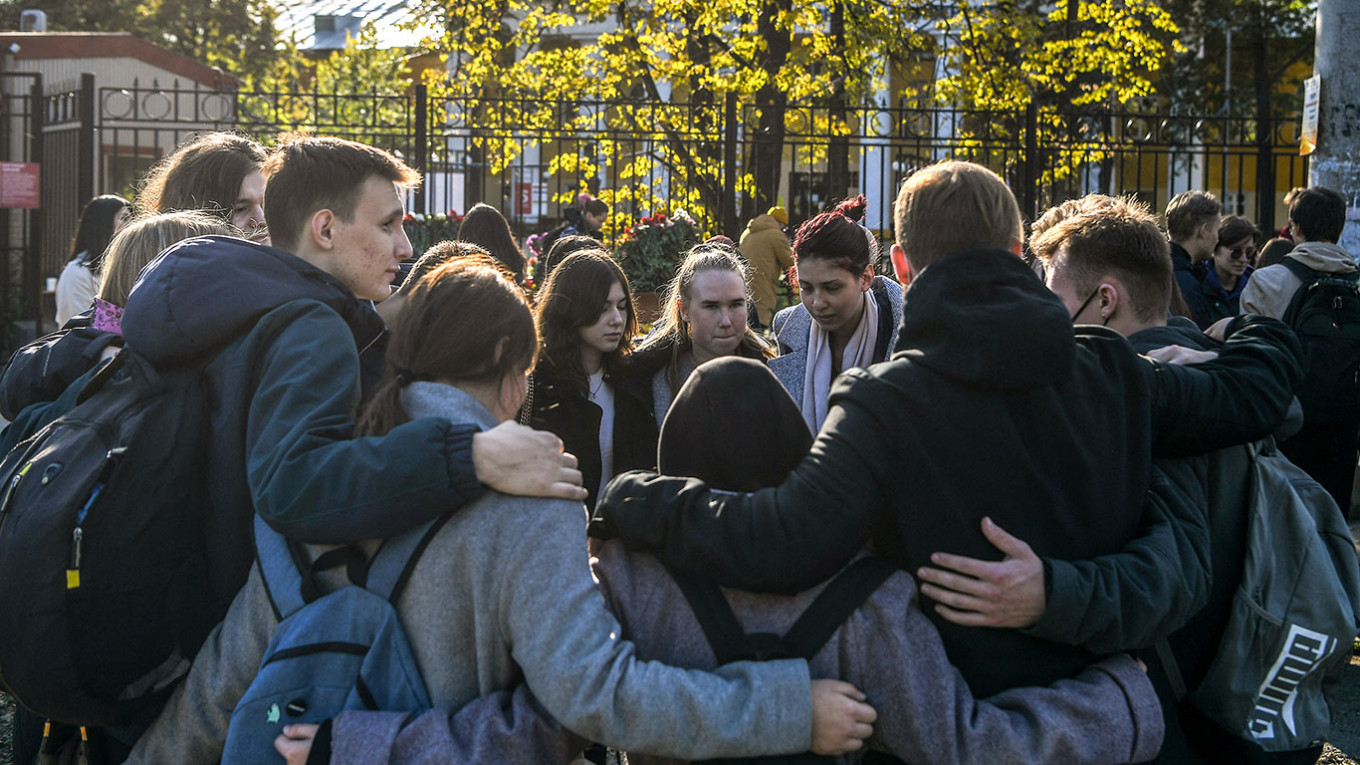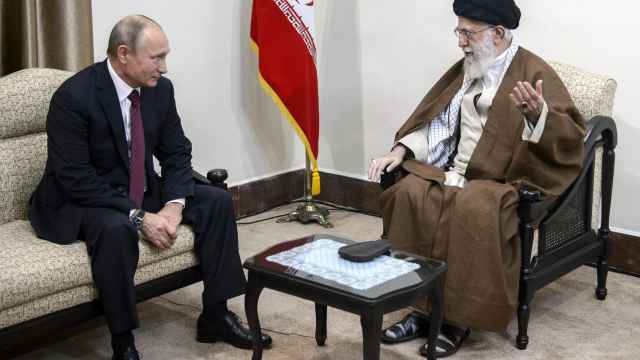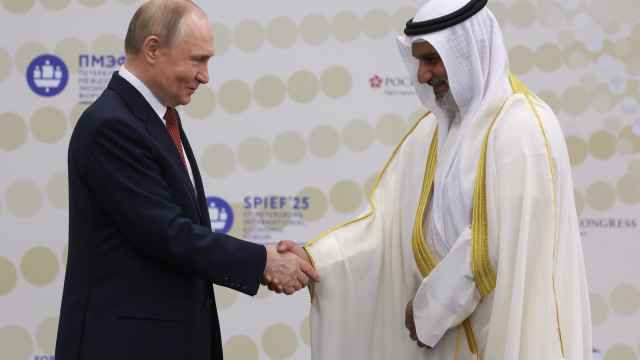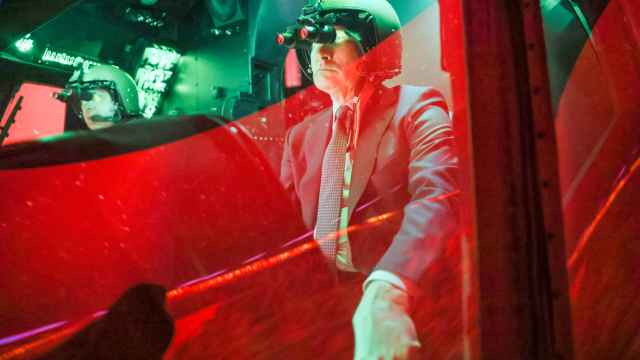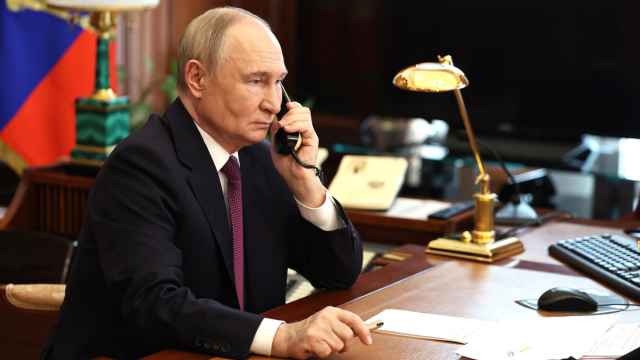Yuri Aydarov was about to start an algorithms class at his university in the central Russian city of Perm when he heard people running in the corridor.
Then he saw a gunman.
Aydarov, a lecturer at Perm State University, was one of the witnesses of a shooting spree in which an 18-year-old student killed six people and wounded nearly 30 on campus on Monday morning.
The attack — one of the worst in recent Russian history — has left the Urals city of around one million people reeling from shock.
Aydarov was able to protect his students by telling them to stay away from windows and forcing the auditorium doors shut with the help of a colleague.
He saw the black-clad shooter — identified as Timur Bekmansurov — walk by his auditorium through a window, saying he was wearing a "sort of helmet."
"We stayed quiet," Aydarov told AFP.
All 17 students and staff members who locked themselves in Aydarov's auditorium survived.
Most of Bekmansurov's victims — mostly aged between 18 and 25 — died in the corridor just outside.
After a day marred by chaos, staff and students at the university struggled to make sense of the violence.
Aydarov said that teachers from "around the world" who have survived similar ordeals have been reaching out to him on social media and it really "helps" him.
'Never thought this could happen'
School shootings are relatively unusual in Russia due to tight security at education facilities and because it is difficult to buy firearms.
But the country has seen an increase in school attacks in recent years.
With lectures at the university canceled on Tuesday, students slowly emerged late from their dorms, traumatized by the mass shooting.
Holding back tears, they laid red carnations at a makeshift memorial at the gates of the university that they walk through every day.
Some recalled finding out there was an attacker in the building from social media, and not believing it before hearing shots.
Others were anxiously awaiting news from wounded classmates, with several of the most seriously injured airlifted some 1,300 kilometers west for further treatment in Moscow.
The deans of all of the city's universities also laid flowers at the gates of the campus in a show of solidarity.
"We feel support from the whole of Russia and that really helps," said politics lecturer Ksenia Punina.
The attacker lay in a hospital across town, heavily injured during his detention. He was reportedly on a ventilator and had his leg amputated.
In May, another teenage gunman killed nine people in a school in Kazan, which lies between Perm and Moscow.
"When this happened in Kazan, I thought this could never happen here in Perm, it's always calm here," said medicine student Maria Denisova.
In recent years, similar attacks also took place in Moscow-annexed Crimea and the far eastern city of Blagoveshchensk.
On the day of the Kazan attack, President Vladimir Putin called for a review of gun control laws.
But some in Perm said more should be done to prevent gun violence.
"If it's so easy for a boy to get hold of (a gun), I think it should be stricter," said 20-year-old Denisova.
The head of the chemistry department, Irina Moshevskaya, said violence was a "systemic problem in our society," blaming it on popular online culture.
Just opposite the heavily guarded campus is a shop selling hunting guns. It was closed on the day after the attack.
Heroic staff
Staff praised the heroism of some lecturers.
Moshevskaya said that staff were able to lock students inside science labs, avoiding more deaths.
One chemistry lecturer "used her laptop bag to make sure her auditorium's doors were tightly shut," she said.
Some students complained that one lecturer had continued his class despite being told an active gunman was in the building.
On the other side of the city, dozens queued at a blood donation center, responding to calls on social media to help the victims.
Most people in Perm praised the quick response of everyone on the campus.
"From first-aid nurses to senior university staff, everyone rose to the occasion," said engineering lecturer and former policeman Aleksei Repyakh.
A Message from The Moscow Times:
Dear readers,
We are facing unprecedented challenges. Russia's Prosecutor General's Office has designated The Moscow Times as an "undesirable" organization, criminalizing our work and putting our staff at risk of prosecution. This follows our earlier unjust labeling as a "foreign agent."
These actions are direct attempts to silence independent journalism in Russia. The authorities claim our work "discredits the decisions of the Russian leadership." We see things differently: we strive to provide accurate, unbiased reporting on Russia.
We, the journalists of The Moscow Times, refuse to be silenced. But to continue our work, we need your help.
Your support, no matter how small, makes a world of difference. If you can, please support us monthly starting from just $2. It's quick to set up, and every contribution makes a significant impact.
By supporting The Moscow Times, you're defending open, independent journalism in the face of repression. Thank you for standing with us.
Remind me later.


